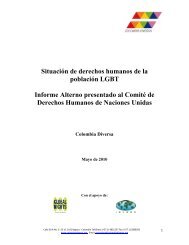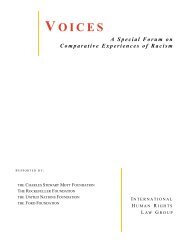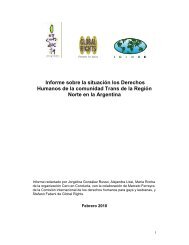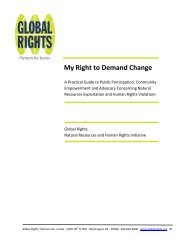The Long Road Home - Global Rights
The Long Road Home - Global Rights
The Long Road Home - Global Rights
Create successful ePaper yourself
Turn your PDF publications into a flip-book with our unique Google optimized e-Paper software.
Burundi’s Land Crisis<br />
Today, with the country now enjoying<br />
peace for the first time in decades, the<br />
number of people who may soon return<br />
home is staggering. In April 2004,<br />
roughly 140,000 Burundians still resided<br />
in the country’s internally displaced<br />
persons camps; at the end of the year,<br />
almost three quarters of a million<br />
remained in Tanzania. <strong>The</strong>se figures<br />
indicate that as the situation in Burundi<br />
improves, nearly one in eight of the<br />
country’s citizens may soon embark on a<br />
return from exile. But according to<br />
Refugees International, more than 95<br />
percent of these displaced Burundians<br />
have no home to which they can return.<br />
History of the Conflict<br />
<strong>The</strong> 1972 violence from which Etienne’s<br />
family fled came just a decade after<br />
Burundi gained its independence from<br />
Belgium, a colonial power that had<br />
privileged the country’s minority Tutsi<br />
population and marginalized the majority<br />
Hutus. In the years leading up to the<br />
violence, a small sub-clan of Tutsis seized<br />
power in a bloody coup and stripped<br />
Hutus of all positions of authority. When<br />
the Hutus revolted, their efforts were met<br />
with disproportionate and systematic<br />
violence from the Tutsi-dominated<br />
military. In the fighting that ensued, about<br />
200,000 Burundians were killed.Hundreds<br />
of thousands of others,like Etienne’s family,<br />
fled to neighboring countries, leaving<br />
behind their land and property.<br />
In the years that followed, this land and<br />
property were illegally occupied,looted or,<br />
in many cases, expropriated by the state. In<br />
the southern city of Rumonge, for<br />
example, where valuable palm plantations<br />
dot the hills, the government seized<br />
property and arbitrarily distributed it to<br />
select businesses and powerful individuals.<br />
Elsewhere, people simply occupied the<br />
empty homes of those who had fled.And<br />
conflict continued unabated.<br />
In 1993, for the first time in Burundi’s<br />
history, a Hutu was elected to the<br />
country’s presidency. Before long, he<br />
began to urge those who had fled the<br />
violence to return home.A generation of<br />
refugees saw hope in this change and<br />
some, like Etienne’s family, began their<br />
journey back to Burundi.<br />
Just months after his election, however,<br />
the president and several members of his<br />
administration were assassinated —<br />
sparking what would beome a 12 year<br />
civil war. It is said that these killings were<br />
motivated, in part, by the government’s<br />
handling of land conflicts. About 300,000<br />
men, women, and children died in this<br />
wave of violence, and 800,000 were<br />
displaced from their homes. Many of<br />
these people fled to neighboring<br />
Tanzania, while others were displaced<br />
within Burundi, settling in squalid camps.<br />
Like those who had fled previous periods<br />
of conflict, these Burundians left behind<br />
property that was soon taken over, adding<br />
yet another layer to the country’s already<br />
serious land crisis.<br />
In 2000, things began to improve when<br />
the warring parties signed the Arusha<br />
Agreement, a comprehensive peace<br />
settlement. Even more significantly, the<br />
government and main rebel groups<br />
agreed to a critical ceasfire. And in early<br />
2005 the country held a peaceful<br />
referendum on its post-transition<br />
constitution, which includes a powersharing<br />
system between Hutus and Tutsis.<br />
A Truth and Reconciliation Commission<br />
has been established,the security situation<br />
has improved drastically, and general<br />
elections will begin in June 2005. With<br />
the possibility of peace now on the<br />
horizon, those forced to flee Burundi’s<br />
waves of conflicts have again begun to<br />
return home.<br />
<strong>Long</strong> <strong>Road</strong> <strong>Home</strong>, continued on page 6<br />
<strong>Global</strong> <strong>Rights</strong> VOICES Summer 2005 5






